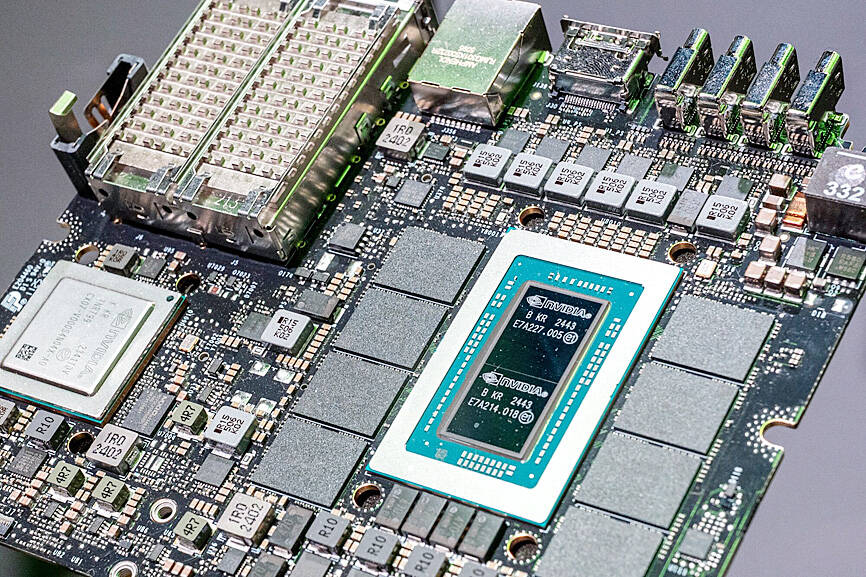Malaysia plans tighter controls over the flow of Nvidia Corp’s chips after the US demanded it keep a closer eye on advanced semiconductors that could potentially make their way to China, the Financial Times (FT) cited Malaysian Minister of Investment, Trade and Industry Tengku Zafrul Abdul Aziz as saying.
Washington asked Malaysia to closely scrutinize the shipment of Nvidia chips coming to the country, Tengku Zafrul told the newspaper. “They want us to make sure that servers end up in the data centers that they’re supposed to and not suddenly move to another ship.”
The minister’s pledge coincides with a Singapore investigation into the final destinations of a bunch of servers likely containing Nvidia chips, after they were allegedly shipped from the city-state to Malaysia.

Photo: Bloomberg
Investigators have charged three men with fraud for allegedly misleading server suppliers Dell Technologies Inc and Super Micro Computer Inc about the final end users of the hardware, which Singaporean authorities said might have contained Nvidia chips that are banned from sale in China.
Washington has for years curbed Chinese imports of advanced semiconductors and the tools used to make them, over concerns that the technology — particularly its artificial intelligence (AI) applications — could fuel Beijing’s military capabilities. They have also expanded some restrictions to countries from Southeast Asia to the Middle East, which US officials worry could serve as back doors for China to access banned tech.
Singapore has recently found itself a focal point of those efforts. Trump administration officials are looking into whether Chinese AI start-up DeepSeek (深度求索) managed to purchase banned Nvidia chips via third parties in Singapore, Bloomberg has reported.
US lawmakers have raised concerns about the large share of Nvidia revenue from Singapore despite relatively small physical shipments to the country, which they say points to possible transshipment of hardware to China.
Singapore and Nvidia officials have said that many Nvidia customers use the island as a centralized billing location, and that the island only receives a small number of physical Nvidia deliveries.

With an approval rating of just two percent, Peruvian President Dina Boluarte might be the world’s most unpopular leader, according to pollsters. Protests greeted her rise to power 29 months ago, and have marked her entire term — joined by assorted scandals, investigations, controversies and a surge in gang violence. The 63-year-old is the target of a dozen probes, including for her alleged failure to declare gifts of luxury jewels and watches, a scandal inevitably dubbed “Rolexgate.” She is also under the microscope for a two-week undeclared absence for nose surgery — which she insists was medical, not cosmetic — and is

CAUTIOUS RECOVERY: While the manufacturing sector returned to growth amid the US-China trade truce, firms remain wary as uncertainty clouds the outlook, the CIER said The local manufacturing sector returned to expansion last month, as the official purchasing managers’ index (PMI) rose 2.1 points to 51.0, driven by a temporary easing in US-China trade tensions, the Chung-Hua Institution for Economic Research (CIER, 中華經濟研究院) said yesterday. The PMI gauges the health of the manufacturing industry, with readings above 50 indicating expansion and those below 50 signaling contraction. “Firms are not as pessimistic as they were in April, but they remain far from optimistic,” CIER president Lien Hsien-ming (連賢明) said at a news conference. The full impact of US tariff decisions is unlikely to become clear until later this month

GROWING CONCERN: Some senior Trump administration officials opposed the UAE expansion over fears that another TSMC project could jeopardize its US investment Taiwan Semiconductor Manufacturing Co (TSMC, 台積電) is evaluating building an advanced production facility in the United Arab Emirates (UAE) and has discussed the possibility with officials in US President Donald Trump’s administration, people familiar with the matter said, in a potentially major bet on the Middle East that would only come to fruition with Washington’s approval. The company has had multiple meetings in the past few months with US Special Envoy to the Middle East Steve Witkoff and officials from MGX, an influential investment vehicle overseen by the UAE president’s brother, the people said. The conversations are a continuation of talks that

CHIP DUTIES: TSMC said it voiced its concerns to Washington about tariffs, telling the US commerce department that it wants ‘fair treatment’ to protect its competitiveness Taiwan Semiconductor Manufacturing Co (TSMC, 台積電) yesterday reiterated robust business prospects for this year as strong artificial intelligence (AI) chip demand from Nvidia Corp and other customers would absorb the impacts of US tariffs. “The impact of tariffs would be indirect, as the custom tax is the importers’ responsibility, not the exporters,” TSMC chairman and chief executive officer C.C. Wei (魏哲家) said at the chipmaker’s annual shareholders’ meeting in Hsinchu City. TSMC’s business could be affected if people become reluctant to buy electronics due to inflated prices, Wei said. In addition, the chipmaker has voiced its concern to the US Department of Commerce